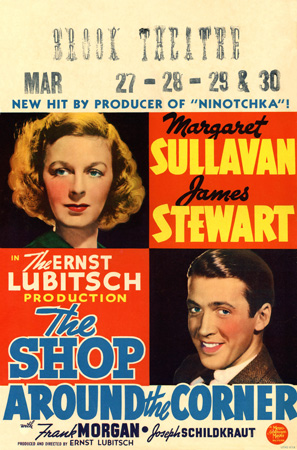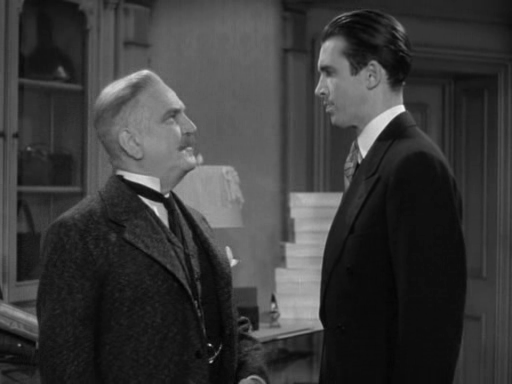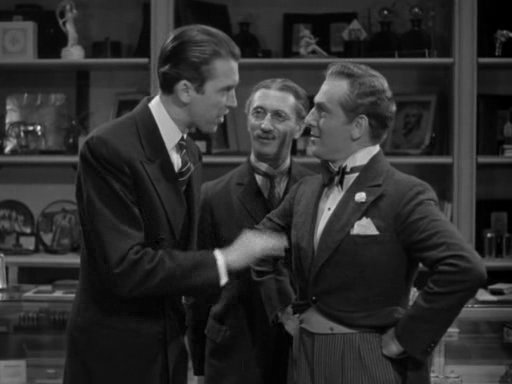 If I could be bothered to check it out I’m sure that I would eventually find an answer to the question that kept bothering me throughout the entire movie – why the fuck is this happening in Budapest? Yes, ye olde notoriety of half-naked gypsy woman dancing with bears on the streets of Budapest didn’t really played any part in this, neither did your usual Hollywood love for anything European had anything to do with it (as far as I can tell). It seems that there’s no real explanation behind it and that the answer can be summed up with – why the fuck not. Still, it’s peculiar and, in any sort of poetic sense, pretty much pointless. As far as the plot is concerned, there’s nothing distinctly Budapestian about it. This could (or couldn’t but I’ll get to that later on) have happened in any shop in the world. At least in the white, West-like part of the world. Maybe I’ll continue to muse about it. Thing like that tend to bother me more than they should.
If I could be bothered to check it out I’m sure that I would eventually find an answer to the question that kept bothering me throughout the entire movie – why the fuck is this happening in Budapest? Yes, ye olde notoriety of half-naked gypsy woman dancing with bears on the streets of Budapest didn’t really played any part in this, neither did your usual Hollywood love for anything European had anything to do with it (as far as I can tell). It seems that there’s no real explanation behind it and that the answer can be summed up with – why the fuck not. Still, it’s peculiar and, in any sort of poetic sense, pretty much pointless. As far as the plot is concerned, there’s nothing distinctly Budapestian about it. This could (or couldn’t but I’ll get to that later on) have happened in any shop in the world. At least in the white, West-like part of the world. Maybe I’ll continue to muse about it. Thing like that tend to bother me more than they should.
In any case (all things Budapest aside), I have not really fallen in love with The Shop Around the Corner. Still, I find it amusing how easily it can be translated in this day and age (let’s forget for a moment that Nora Ephron did exactly that in a horrendous You’ve got mail). If anything, this shows that some genre-formulas are more persistent than we might think (considering that, sometimes it seems that ‘60s didn’t happen at all). It’s not only that romantic setup can be easily transposed, it’s that the entire movie can be re-contextualized without any sort of actual recontextualization. Bad economy and fear of unemployment? Check. Anonymous dating service for people too shy or too busy to date? Check. Benevolent shop owners? Well, this is where we part. I yet have to see cashier at Walmart being this grateful and full of praise for her employer. Problems of the salary gap somehow managed to sink in.
 This is not the only noticeable discrepancy between now and then. Since the dawn of the internet, many a movie (or a TV-show) has featured anonymous online communication (the amount of sensationalism differed from movie to movie) as the central motif. Whether it was made fun of, or it was used as a starting point for a movie about vicious killing spree of loner computer hacker gone psychotic, it always revolved around some sort of paranoia, fear or uneasiness. It wasn’t just a fear of does she look good type (this has been reiterated in various contexts over and over again), it was more of a what kind of weirdo uses this type of thing and will I get slaughtered if I go to meet him problem. Whenever I think about it, it seems that our society has somehow evolved from easy going (yet conservative) adventurousness of the Old Hollywood (where taking a chance was prominently featured), into a society of a raging paranoia and some sort of social awkwardness. Considering the imagery (and dominant ideology of the silver screen) it might have something to do with both the consumers of movies and active participants in societal game.
This is not the only noticeable discrepancy between now and then. Since the dawn of the internet, many a movie (or a TV-show) has featured anonymous online communication (the amount of sensationalism differed from movie to movie) as the central motif. Whether it was made fun of, or it was used as a starting point for a movie about vicious killing spree of loner computer hacker gone psychotic, it always revolved around some sort of paranoia, fear or uneasiness. It wasn’t just a fear of does she look good type (this has been reiterated in various contexts over and over again), it was more of a what kind of weirdo uses this type of thing and will I get slaughtered if I go to meet him problem. Whenever I think about it, it seems that our society has somehow evolved from easy going (yet conservative) adventurousness of the Old Hollywood (where taking a chance was prominently featured), into a society of a raging paranoia and some sort of social awkwardness. Considering the imagery (and dominant ideology of the silver screen) it might have something to do with both the consumers of movies and active participants in societal game.
 For Ernst Lubitsch and his world this anonymous communication didn’t present any problem. People who did that type of thing were all more or less sensible grown up men and women, eager to try something new yet sensible enough not to budge an inch on important things (whatever those might be). These people were both the consumers and the Society (or at least the ideal projection of it). During the dawn of the internet these things changed. Majority of the consumers were teenagers and dominant users of new technology were teenagers as well. In Hollywood imagery, teenagers and reason never went together which meant that there had to be a predator present just so that didactic dimension of pop-morality could be preserved in movies. You could trust James Stewart to make a right call (he made a career with these roles). You couldn’t do the same with Lindsay Lohan.
For Ernst Lubitsch and his world this anonymous communication didn’t present any problem. People who did that type of thing were all more or less sensible grown up men and women, eager to try something new yet sensible enough not to budge an inch on important things (whatever those might be). These people were both the consumers and the Society (or at least the ideal projection of it). During the dawn of the internet these things changed. Majority of the consumers were teenagers and dominant users of new technology were teenagers as well. In Hollywood imagery, teenagers and reason never went together which meant that there had to be a predator present just so that didactic dimension of pop-morality could be preserved in movies. You could trust James Stewart to make a right call (he made a career with these roles). You couldn’t do the same with Lindsay Lohan.
Part of me interested in phenomenology is interested in these things. Especially when there’s nothing else to observe. Because, The Shop Around the Corner was both idiotic and predictable and my mind just couldn’t salvage it no matter how hard it tried. The chemistry between James Stewart and Margaret Sullawan was horrible, plot was handled badly and suspension of disbelief had to kick in hard, their subsequent falling in love and reconciliation was so stretched that it verged on parody and there were times when stupidity of it all made me cringe. Considering 1940s, both His Girl Friday and The Philadelphia Story were miles ahead of this crap. Fuck it, can’t win ‘em all. No matter how much I like these movies, sooner or later one is bound to come across something that has no script, style, direction or any particular redeeming quality to speak of. The Shop Around the Corner is one such feature, better to be forgotten than revisited for any reason.
| Directed by | Ernst Lubitsch |
|---|---|
| Produced by | Ernst Lubitsch |
| Screenplay by |
|
| Based on | Parfumerie by Miklós László |
| Starring | |
| Music by | Werner R. Heymann |
| Cinematography | William H. Daniels |
| Edited by | Gene Ruggiero |
| Production company |
Metro-Goldwyn-Mayer |